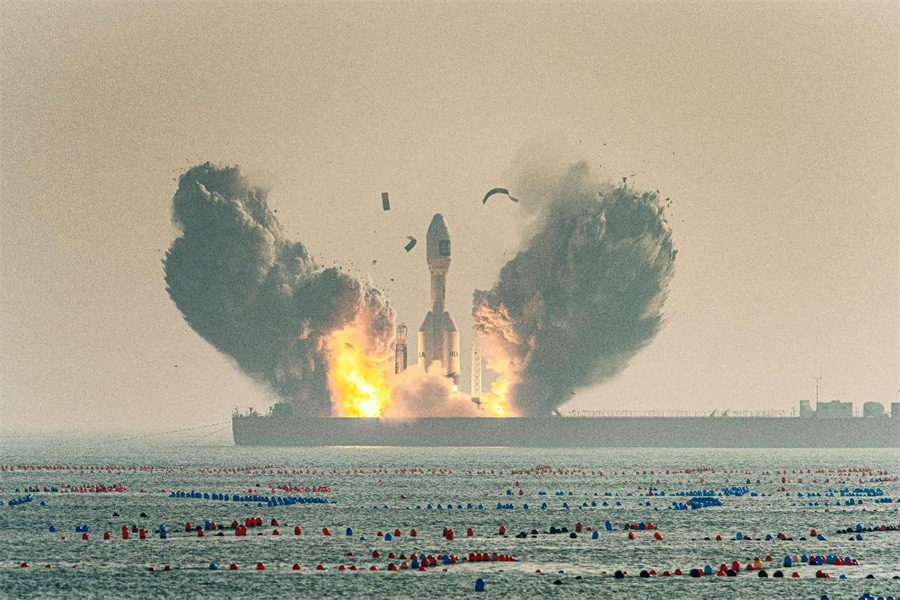Emerging industries thrive in E China's Shandong
In January this year, a rocket was launched from a ship in the Yellow Sea off the coast of Haiyang, east China's Shandong province.
How could this rocket launch be completed on the deck of a ship?

A Gravity-1 commercial carrier rocket, developed by Chinese commercial aerospace company OrienSpace, is launched from waters off the coast of Haiyang, east China's Shandong province, Jan. 11, 2024. [People's Daily Online/Ding Yi]
On one hand, Haiyang sits in a unique and safe location, which makes it suitable for launching satellites into various orbits, including low-inclination and sun-synchronous orbits.
On the other hand, Haiyang has seized the precious opportunity presented by the development of the aerospace industry and vigorously promoted emerging industries.
In 2019, China completed its first space launch from a sea-based platform as a Long March-11 solid propellant carrier rocket blasted off in Haiyang. The local government has taken the successful test launch as an opportunity to develop aerospace industry, establishing the Haiyang Oriental Aerospace Port. It has built a commercial aerospace industry cluster centering on the entire offshore rocket launch industrial chain and kept enhancing relevant services.
In June 2023, a company planned to install launch support equipment in Haiyang. However, the relevant personnel from the company were unable to arrive on time to submit required application materials in person.
After learning the situation, the local administrative examination and approval bureau initiated an online approval process, allowing the company to first submit critical application materials and then supply the remaining documents after obtaining the project code. This enabled smooth process of the project.
Haiyang follows the requirements of high-quality development in every aspect and the whole process, from approving projects, introducing industries and building industrial bases, to its efforts to set up an aerospace science museum and featured towns.
It is attracting more and more enterprises in upstream and downstream sectors, laying a solid foundation for the development of emerging industries.
High-quality development is key to cultivating and strengthening emerging industries. During the first quarter of this year, Shandong province channeled quality resources into nurturing and expanding 32 strategic emerging industrial clusters at and above provincial level, whose total output hit 3.2 trillion yuan ($433.91 billion).

Visitors experience a multi-axis trainer in an aerospace science museum in the Haiyang Oriental Aerospace Port, east China's Shandong province. [People's Daily Online/Tang Ke]
For local economic development, introducing emerging industries is just the beginning, and the road to nurturing and strengthening industrial clusters is still long.
A company producing lithium-ion batteries decided to settle in Zaozhuang National High-tech Industrial Development Zone in Shandong province. The head of the company said that the development zone has a clear development plan for the lithium-ion battery industry and a persevering spirit. The local government established a dedicated service team to closely follow the production progress of the company, from site selection to factory designing, and from facility construction to equipment debugging. The company also mustered its efforts and advanced steadily, contributing to local economic and social development.
With a top-level design for industrial development, well-planned guidance for business operations, and a clear roadmap, the growth prospects and momentum for emerging industries have become even greater.
Talents are vital for cultivating emerging industries. To unleash the power of talent, Zaozhuang of Shandong province has introduced policies that outline measures for attracting, rewarding, and supporting talents in the lithium-ion battery industry.
Zhang Jingpeng, the lead researcher of Shandong Goldencell Electronics Technology Co., Ltd., has greatly benefited from these policies - Zhang and her team has received a cumulative reward of 3.9 million yuan for independently developing nine lithium iron phosphate battery products.
In addition to tapping into talent resources, emphasis should also be placed on recruitment and university-enterprise cooperation. Since the beginning of this year, Zaozhuang has introduced more than 870 talents of various kinds for lithium-ion battery companies. By providing excellent platforms and ensuring competitive income, the city has built a sound workforce that leads industrial development.
Adapting to local conditions, seizing opportunities, and accelerating the cultivation and growth of emerging industries, regions across China are seeing robust high-quality development.
























